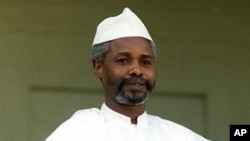A regional court in West Africa has ruled that Senegal cannot, by itself, try Hissène Habré for war crimes the former Chadian dictator committed during the 1980s. The verdict comes as a green light for the special tribunal human rights lobbyists have long been calling for.
The decision reached by the West African Economic Community's regional court in Abuja arrived as a victory to Hissène Habré and his legal team - but it's also seen as a victory for the human rights advocates that have been campaigning to see the former Chadian coup leader jailed for war crimes.
Habré stands accused of orchestrating 40,000 political murders committed during his eight-year so-called Toyota war with Libya, which the US-backed leader won after his army received some 400 pick-up trucks.
But 20 years after rebels forced Habré from the capital, the 68-year-old finds himself in house arrest in Senegal - a country that has gone so far as to revise its penal codes in order to bring Habré to justice.
Those revisions would allow Habré to become the first African head of state tried for war crimes by a fellow African nation, but in their appeal to the regional court of justice, his lawyers said he was being unfairly targeted by a state that has violated his human rights.
Habré's lawyer Francois Serres says the court's decision to support his appeal prevents the Senegalese state from trying his client.
He says the court has just rendered a very crucial judgment that confirms what Hissène Habré has been arguing for two years now.
When Senegal received an African Union mandate to try Habré, it wrote crimes laws into its legal code to retroactively apply to Habre, but Serres says those laws constitute one of the many ways Senegal has violated Habré's human rights.
The court has made sense of the mandate that Senegal recieved from the African Union, he said. It's ruled that Senegal cannot accomplish this mandate in light of the ongoing violations that have transpired over the past two years now, he says. Only - and perhaps - he added, a special tribunal or international court could fulfill this mandate.
And yet, a special tribune is precisely what the Senegalese state says its preparing to organize, in a drive to try Habré that has drawn on for over four years.
In a statement e-mailed to Voice of America, today, Human Right Watch spokesperson Reed Brody said the court's decision finally allows Senegal to proceed with what would be a historic tribunal.
The preparations for such a tribunal, are already under way, Senegalese government lawyer Sadel Ndiaye says.
He says that the country is going to meet wth the African Union, and consider how they can fund and operate a special African Union tribunal that will be tasked with the mission of finally trying Hissene Habre. He says this tribunal is going to be modeled off trials like those conducted on Sierra Leone, Rwanda, Yugoslavia.
Funding remains the final hurdle confronting such a tribunal, as the Senegalese Justice Ministry has yet to approve a case budget that international donors are comfortable with. Advocates lobbying for a cost-efficient and timely trial are scheduled to meet next week in a call for the process to begin.
ECOWAS Court Rules Senegal Must Use Tribunal to Try Hissene Habré
- By Drew Hinshaw




